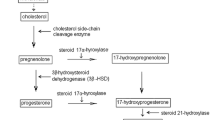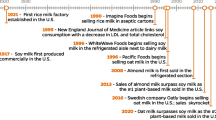Abstract
Introduction
Milk is a good source of bioavailable calcium compared with other foods. Recent in vitro and in vivo studies have shown that milk whey protein, especially its basic protein fraction (milk basic protein, MBP), contains several components capable of promoting bone formation and inhibiting bone resorption. The objective of this study was to examine the effects of MBP on bone mineral density (BMD) and bone metabolism of healthy young women.
Methods
Eighty-four healthy young women were randomly assigned to three groups: control group, whole milk group or MBP group treated with milk containing 40 mg MBP for 8 months. The bone mineral density of total body, the lumbar vertebrae L2–L4 and the left forearm of each subject were measured by dual-energy X-ray absorptiometry (DEXA) at 0 and 8 months of treatment. Serum indexes of bone metabolism were measured at 0, 3, 6 and 8 months. Eighty-one subjects who completed the study in accordance with the protocol were included in the analysis.
Results
Total BMD in all groups significantly increased compared with baseline values. However, no significant difference on the mean rate of gain of total BMD was observed among the MBP group (2.19%), the whole milk group (2.63%) and the control group (1.61%). Serum cross-linked N-teleopeptides of type-I collagen (NTx) in MBP group at 8 months and in whole milk group at 6 months were significantly decreased from baseline. There were no significant differences between whole milk group and MBP group; however, after combining the milk groups, NTx had significantly decreased from baseline. No significant increase was observed in serum bone-specific alkaline phosphatase (BAP) in both whole milk group and MBP group.
Conclusion
No significant effect of MBP on bone mineral density and bone metabolism was observed, but milk supplementation was effective in suppressing bone resorption.


Similar content being viewed by others
References
Adolphi B, Scholz-Ahrens KE, de Vrese M, Acil Y, Laue C, Schrezenmeir J (2008) Short-term effect of bedtime consumption of fermented milk supplemented with calcium, inulin-type fructans and caseinphosphopeptides on bone metabolism in healthy, postmenopausal women. Eur J Nut 48(1):45–53. doi:10.1007/s00394-008-0759-y
Aoe S, Toba Y, Yamamura J, Kawakami H, Yahiro M, Kumegawa M, Itabashi A, Takada Y (2001) Controlled trial of the effects of milk basic protein supplementation on bone metabolism in health adult women. Biosci Biotechnol Biochem 65(4):913–918
Aoe S, Koyama T, Toba Y, Itabashi A, Takada Y (2005) A controlled trial of the effect of milk basic protein (MBP) supplementation on bone metabolism in healthy menopausal women. Osteoporos Int 16:2123–2128
Bugel S (2003) Vitamin K and bone health. Proc Nutr Soc 62:839–843
Hanson DA, Weis MA, Bollen AM, Maslan SL, Singer FR, Eyre DR (1992) A specific immunoassay for monitoring human bone resorption: quantization of type I collagen cross-linked N-telopeptides in urine. J Bone Miner Res 7:1251–1258
Ishimi Y, Miyaura C, Ohmura M, Onoe Y, Sato T, Uchiyama Y, Ito M, Wang XX, Suda T, Ikegami S (1999) Selective effects of genistein, a soybean isoflavone, on B-lymphopoiesis and bone loss caused by estrogen deficiency. Endocrinology 140:1893–1900
Institute of Nutrition and Food Safety, Center of Disease Control, China (2004) China food composition. Peking University Medical Press, Beijing
Keen R (2007) Osteoporosis: strategies for prevention and management. Best Pract Res CL RH 21(1):109–122
Ott SM (1996) Theoretical and methodological approach. In: Bilezikian JP, Raisz LG, Rodan GA (eds) Principles of bone biology. Academic Press, San Diego, pp 231–241
Scholz-Ahrens KE, Schrezenmeir J (2000) Effects of bioactive substances in milk on mineral and trace element metabolism with special reference to casein phosphopeptides. Br J Nutr 84(Suppl 1):S147–S153
Takada Y, Aoe S, Kumegawa M (1996) Whey protein stimulates the proliferation and differentiation of osteoblastic MC3T3-E1 cells. Biochem Biophys Res Commun 223:445–449
Takada Y, Kobayashi N, Mastsuyama H, Kato K, Yamamura J, Yahiro M, Kumegawa M, Aoe S (1997) Whey protein suppresses the osteoclast-mediated bone resorption and osteoclast cell formation. Int Dairy J 6(7):821–825
Takada Y, Kobayashi N, Kato K, Mastsuyama H, Yahiro M, Aoe S (1997) Effect of whey protein on calcium and bone metabolism in ovariectomized rats. J Nutr Sci Vitaminol 43:199–210
Takada Y, Mastsuyama H, Kato K, Kobayashi N, Yamamura J, Yahiro M, Ace S (1997) Milk whey protein enhances the bone breaking force in ovariectomized rats. Nutr Res 17(12):1709–1720
Toba Y, Takada Y, Yamamura J, Tanaka M, Matsuoka Y, Kawakami H, Itabashi A, Aoe S, Kumegawa (2000) Milk basic protein: a novel protective function of milk against osteoporosis. Bone Miner 9(27):403–408
Toba Y, Takada Y, Matsuoka Y, Morita Y, Motouri M, Hirai T, Suguri T, Aoe S, Kawakami H, Kumegawa M, Takeuchi A, Itabashi A (2001) Milk basic protein (MBP) promotes bone formation and suppresses bone resorption in healthy adult men. Biosci Biotechnol Biochem 65(12):1353–1357
Uenishi K, Ishida H, Toba Y, Aoe S, Itabashi A, Takada Y (2007) Milk basic protein increase bone mineral density and improves bone metabolism in healthy young women. Osteoporos Int 18:385–390
World Health Organization (2003) Prevention and management of osteoporosis. WHO Technical Report Series no. 921. WHO, Geneva
Yamamura J, Aoe S, Toba Y, Motouri M, Kawakami H, Kumegawa M, Itabashi A, Takada Y (2002) Milk basic protein (MBP) increases radial bone mineral density in healthy adult women. Biosci Biotechnol Biochem 66(3):702–704
Acknowledgments
This study was conducted at Department of Nutrition and Food Hygiene, School of Public Health, Peking University, with funding from MengNiu Research Center. The authors gratefully acknowledge the technical help of Mr. Chang-Yong Xue (People’s Liberation Army General Hospital, Beijing, China) with food analysis records, and also acknowledge the instruction of statistical analysis by Mr. Wei-Ning Yi, Mr. Xiao-Dong Sun (Peking University).
Conflict of interest statement
None.
Author information
Authors and Affiliations
Corresponding author
Rights and permissions
About this article
Cite this article
Zou, ZY., Lin, XM., Xu, XR. et al. Evaluation of milk basic protein supplementation on bone density and bone metabolism in Chinese young women. Eur J Nutr 48, 301–306 (2009). https://doi.org/10.1007/s00394-009-0014-1
Received:
Accepted:
Published:
Issue Date:
DOI: https://doi.org/10.1007/s00394-009-0014-1




